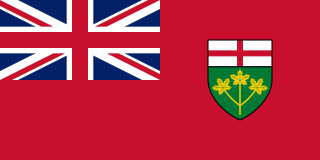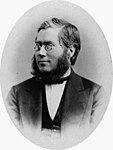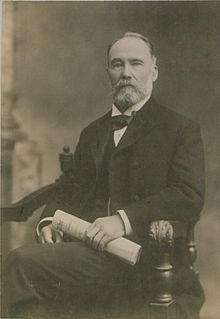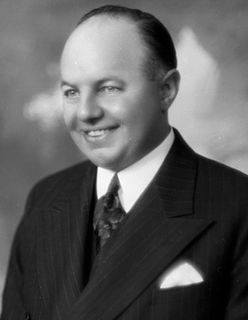| |||||||||||||||||||||||||
94 seats in the 8th Legislative Assembly of Ontario 48 seats were needed for a majority | |||||||||||||||||||||||||
| |||||||||||||||||||||||||
| |||||||||||||||||||||||||
The Ontario general election, 1894 was the eighth general election held in the Province of Ontario, Canada. It was held on June 26, 1894, to elect the 94 Members of the 8th Legislative Assembly of Ontario ("MLAs").

Ontario is one of the 13 provinces and territories of Canada and is located in east-central Canada. It is Canada's most populous province accounting for 38.3 percent of the country's population, and is the second-largest province in total area. Ontario is fourth-largest jurisdiction in total area when the territories of the Northwest Territories and Nunavut are included. It is home to the nation's capital city, Ottawa, and the nation's most populous city, Toronto, which is also Ontario's provincial capital.
Contents
The main issues were the Liberals' "Ontario System", as well as French language schools, farmer interests, support for Toronto business, woman suffrage, the temperance movement, and the demands of labour unions. [1]
The Ontario Liberal Party, led by Oliver Mowat, formed the government for the seventh consecutive parliament, even though some of its members were elected under joint banners: either with the Patrons of Industry or the Protestant Protective Association.
The Ontario Liberal Party is a provincial political party in the province of Ontario, Canada. The party is ideologically aligned with the Liberal Party of Canada but the two parties are organizationally independent and have separate, though overlapping, memberships.

Sir Oliver Mowat, was a Canadian lawyer, politician, and Liberal Party leader. He served for nearly 24 years as the third Premier of Ontario. He was the eighth Lieutenant Governor of Ontario and one of the Fathers of Confederation. He is best known for defending successfully the constitutional rights of the provinces in the face of the centralizing tendency of the national government as represented by his longtime conservative adversary, John A. Macdonald. This longevity and power was due to his political maneuvering, in terms of building a political base around Liberals, Catholics, trade unions, and anti-French-Canadian sentiment.
The Ontario Conservative Party, led by William Ralph Meredith, formed the official opposition.

Sir William Ralph Meredith, was Leader of the Ontario Conservatives from 1878 to 1894, Chancellor of the University of Toronto from 1900 until his death, and Chief Justice of Ontario from 1913 until his death. Through his principles - The Meredith Principles - he is regarded as the founding father of the Workers' Compensation System in Ontario, the impact of which was felt throughout Canada and the United States.
The Patrons of Industry, a farmers' organization formed in 1890, cooperated with the urban labour movement to address the political frustrations of both groups with big business. Sixteen members of the Legislative Assembly were elected with Patrons of Industry support—12 Liberals, one Conservative, and three who ran only under the "Patrons of Industry" banner.

The Patrons of Industry in Canada were based on the Patrons of Industry of Michigan that had formed in 1889. It was dedicated to upholding and encouraging the moral, social, intellectual, political and financial situation of farmers and to preserve the way of life that existed in farming communities in the late nineteenth century against encroaching industrialization. It cooperated with the urban labour movement to address the political frustrations of both groups with big business.
Big business involves large-scale corporate-controlled financial or business activities. As a term, it describes activities that run from "huge transactions" to the more general "doing big things". The concept first rose in a symbolic sense after 1880 in connection with the combination movement that began in American business at that time. United States corporations that fall into the category of "big business" as of 2015 include ExxonMobil, Walmart, Google, Microsoft, Apple, General Electric, General Motors, Citigroup, Goldman Sachs, and JPMorgan Chase. The largest German corporations as of 2012 included Daimler AG, Deutsche Telekom, Siemens, and Deutsche Bank. Among the largest companies in the United Kingdom as of 2012 are HSBC, Barclays, WPP plc, and BP. The latter half of the 19th century saw more technological advances and corporate growth in additional sectors, such as petroleum, machinery, chemicals, and electrical equipment.
The Protestant Protective Association (PPA) was an anti-Catholic group, associated with the Orange Order. It campaigned against the rights of Catholics and French-Canadians, and argued that Roman Catholics were attempting to take over Ontario. Nine candidates were elected with PPA support, 6 Conservatives, 1 Liberal and 2 who ran only under the PPA banner. The PPA worked most closely with the Conservative opposition.
The Protestant Protective Association was an anti-Catholic group in the 1890s based in Ontario, Canada, associated with the Orange Order. Originally a spinoff of the American group the American Protective Association, it became independent in 1892. The PPA denounced the role of Catholics and French-Canadians in politics, and warned Protestants that Catholics were attempting to take over Ontario. It aimed to eliminate French language education in schools in Ontario and western Canada, and to roll back or block Catholic school systems in those provinces.









